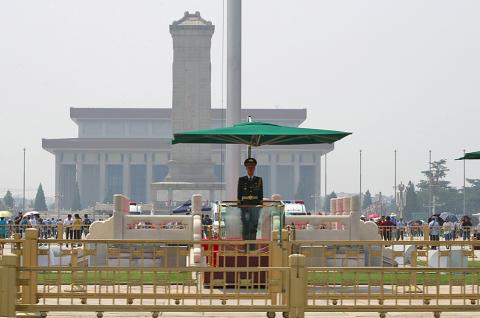Beijing yesterday marked 30 years since the Tiananmen Square Massacre with a wall of silence and extra security.
Police checked the identification cards of every tourist and commuter leaving the subway near Tiananmen Square, the site of the pro-democracy protests that were brutally extinguished by tanks and soldiers on June 3 and 4, 1989.
Foreign journalists were not allowed onto the square at all or warned by police not to take pictures.

Photo: EPA-EFE
Officials told one reporter that “illegal media behavior” could affect visa renewals.
Meanwhile, Washington marked the occasion by hailing the “heroic” movement of 1989.
The Chinese Communist Party detained several pro-democracy advocates in the run-up to yesterday, while popular livestreaming sites conspicuously shut down for “technical” maintenance.
Searches for the term “Tiananmen” on the Sina Weibo platform yesterday displayed the official logo of the 70th anniversary of the founding of communist China.
Over the years, the party has censored any discussion of the protests and crackdown, which left hundreds, possibly more than 1,000 people, dead — ensuring that people either never learn about what happened or fear to discuss it.
The party and its high-tech police apparatus have tightened control over civil society since Chinese President Xi Jinping (習近平) took office, rounding up pro-democracy advocates, rights lawyers and even Marxist students who sympathized with labor movements.
Countless surveillance cameras are perched on lampposts in and around Tiananmen Square.
“It’s not that we don’t care. We know what happened,” said a Didi Chuxing driver. “But how can I tell you when the DiDi Chuxing app is recording our conversation?”
“Today’s China has changed,” he added. “If you have money, you have everything. Without money, you dare not open your mouth.”
It was largely business as usual at Tiananmen yesterday: Hundreds of people, including children waving small Chinese flags while sitting on their parents’ shoulders, lined up to watch the daily flag-raising.
However, the line moved slowly due to extra security, with identification cards matched on facial recognition screens.
When asked whether it occurred to her that she was visiting the square on the 30th anniversary of the Tiananmen Square Massacre, a nursing school graduate in her 20s from eastern Shandong Province said: “What do you mean? No, it didn’t cross my mind.”
Her mother added: “We don’t think of that past.”

Right-wing political scientist Laura Fernandez on Sunday won Costa Rica’s presidential election by a landslide, after promising to crack down on rising violence linked to the cocaine trade. Fernandez’s nearest rival, economist Alvaro Ramos, conceded defeat as results showed the ruling party far exceeding the threshold of 40 percent needed to avoid a runoff. With 94 percent of polling stations counted, the political heir of outgoing Costa Rican President Rodrigo Chaves had captured 48.3 percent of the vote compared with Ramos’ 33.4 percent, the Supreme Electoral Tribunal said. As soon as the first results were announced, members of Fernandez’s Sovereign People’s Party

MORE RESPONSIBILITY: Draftees would be expected to fight alongside professional soldiers, likely requiring the transformation of some training brigades into combat units The armed forces are to start incorporating new conscripts into combined arms brigades this year to enhance combat readiness, the Executive Yuan’s latest policy report said. The new policy would affect Taiwanese men entering the military for their compulsory service, which was extended to one year under reforms by then-president Tsai Ing-wen (蔡英文) in 2022. The conscripts would be trained to operate machine guns, uncrewed aerial vehicles, anti-tank guided missile launchers and Stinger air defense systems, the report said, adding that the basic training would be lengthened to eight weeks. After basic training, conscripts would be sorted into infantry battalions that would take

GROWING AMBITIONS: The scale and tempo of the operations show that the Strait has become the core theater for China to expand its security interests, the report said Chinese military aircraft incursions around Taiwan have surged nearly 15-fold over the past five years, according to a report released yesterday by the Democratic Progressive Party’s (DPP) Department of China Affairs. Sorties in the Taiwan Strait were previously irregular, totaling 380 in 2020, but have since evolved into routine operations, the report showed. “This demonstrates that the Taiwan Strait has become both the starting point and testing ground for Beijing’s expansionist ambitions,” it said. Driven by military expansionism, China is systematically pursuing actions aimed at altering the regional “status quo,” the department said, adding that Taiwan represents the most critical link in China’s

EMERGING FIELDS: The Chinese president said that the two countries would explore cooperation in green technology, the digital economy and artificial intelligence Chinese President Xi Jinping (習近平) yesterday called for an “equal and orderly multipolar world” in the face of “unilateral bullying,” in an apparent jab at the US. Xi was speaking during talks in Beijing with Uruguayan President Yamandu Orsi, the first South American leader to visit China since US special forces captured then-Venezuelan president Nicolas Maduro last month — an operation that Beijing condemned as a violation of sovereignty. Orsi follows a slew of leaders to have visited China seeking to boost ties with the world’s second-largest economy to hedge against US President Donald Trump’s increasingly unpredictable administration. “The international situation is fraught